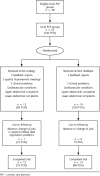Improving test ordering in primary care: the added value of a small-group quality improvement strategy compared with classic feedback only
- PMID: 15576543
- PMCID: PMC1466745
- DOI: 10.1370/afm.244
Improving test ordering in primary care: the added value of a small-group quality improvement strategy compared with classic feedback only
Abstract
Purpose: We wanted to evaluate the added value of small peer-group quality improvement meetings compared with simple feedback as a strategy to improve test-ordering behavior. Numbers of tests ordered by primary care physicians are increasing, and many of these tests seem to be unnecessary according to established, evidence-based guidelines.
Methods: We enrolled 194 primary care physicians from 27 local primary care practice groups in 5 health care regions (5 diagnostic centers). The study was a cluster randomized trial with randomization at the local physician group level. We evaluated an innovative, multifaceted strategy, combining written comparative feedback, group education on national guidelines, and social influence by peers in quality improvement sessions in small groups. The strategy was aimed at 3 specific clinical topics: cardiovascular issues, upper abdominal complaints, and lower abdominal complaints. The mean number of tests per physician per 6 months at baseline and the physicians' region were used as independent variables, and the mean number of tests per physician per 6 months was the dependent variable.
Results: The new strategy was executed in 13 primary care groups, whereas 14 groups received feedback only. For all 3 clinical topics, the decrease in mean total number of tests ordered by physicians in the intervention arm was far more substantial (on average 51 fewer tests per physician per half-year) than the decrease in mean number of tests ordered by physicians in the feedback arm (P = .005). Five tests considered to be inappropriate for the clinical problem of upper abdominal complaints decreased in the intervention arm, with physicians in the feedback arm ordering 13 more tests per 6 months (P = .002). Interdoctor variation in test ordering decreased more in the intervention arm.
Conclusion: Compared with only disseminating comparative feedback reports to primary care physicians, the new strategy of involving peer interaction and social influence improved the physicians' test-ordering behavior. To be effective, feedback needs to be integrated in an interactive, educational environment.
Figures



Similar articles
-
Effect of audit and feedback with peer review on general practitioners' prescribing and test ordering performance: a cluster-randomized controlled trial.BMC Fam Pract. 2017 Apr 13;18(1):53. doi: 10.1186/s12875-017-0605-5. BMC Fam Pract. 2017. PMID: 28407754 Free PMC article. Clinical Trial.
-
Effect of a practice-based strategy on test ordering performance of primary care physicians: a randomized trial.JAMA. 2003 May 14;289(18):2407-12. doi: 10.1001/jama.289.18.2407. JAMA. 2003. PMID: 12746365 Clinical Trial.
-
Comparing cost effects of two quality strategies to improve test ordering in primary care: a randomized trial.Int J Qual Health Care. 2004 Oct;16(5):391-8. doi: 10.1093/intqhc/mzh070. Int J Qual Health Care. 2004. PMID: 15375100 Clinical Trial.
-
Effect of Social Comparison Feedback on Laboratory Test Ordering for Hospitalized Patients: A Randomized Controlled Trial.J Gen Intern Med. 2018 Oct;33(10):1639-1645. doi: 10.1007/s11606-018-4482-y. Epub 2018 May 22. J Gen Intern Med. 2018. PMID: 29790072 Free PMC article. Clinical Trial.
-
Laboratory investigation utilization in pediatric out-patient department Ramathibodi Hospital.J Med Assoc Thai. 1993 Oct;76 Suppl 2:194-208. J Med Assoc Thai. 1993. PMID: 7822993 Clinical Trial.
Cited by
-
What motivates general practitioners to change practice behaviour? A qualitative study of audit and feedback group sessions in Dutch general practice.BMJ Open. 2019 Jun 1;9(5):e025286. doi: 10.1136/bmjopen-2018-025286. BMJ Open. 2019. PMID: 31154299 Free PMC article.
-
Effect of audit and feedback with peer review on general practitioners' prescribing and test ordering performance: a cluster-randomized controlled trial.BMC Fam Pract. 2017 Apr 13;18(1):53. doi: 10.1186/s12875-017-0605-5. BMC Fam Pract. 2017. PMID: 28407754 Free PMC article. Clinical Trial.
-
A cluster randomized controlled trial aimed at implementation of local quality improvement collaboratives to improve prescribing and test ordering performance of general practitioners: study protocol.Implement Sci. 2009 Feb 17;4:6. doi: 10.1186/1748-5908-4-6. Implement Sci. 2009. PMID: 19222840 Free PMC article.
-
Continuing education meetings and workshops: effects on professional practice and health care outcomes.Cochrane Database Syst Rev. 2009 Apr 15;2009(2):CD003030. doi: 10.1002/14651858.CD003030.pub2. Cochrane Database Syst Rev. 2009. Update in: Cochrane Database Syst Rev. 2021 Sep 15;9:CD003030. doi: 10.1002/14651858.CD003030.pub3. PMID: 19370580 Free PMC article. Updated.
-
Implementation fidelity in a multifaceted program to foster rational antibiotics use in primary care: an observational study.BMC Med Res Methodol. 2022 Sep 19;22(1):243. doi: 10.1186/s12874-022-01725-3. BMC Med Res Methodol. 2022. PMID: 36123597 Free PMC article. Clinical Trial.
References
-
- Kassiser JP. Our stubborn quest for diagnostic certainty. A cause of excessive testing. New Engl J Med. 1989;320:1489–1491. - PubMed
-
- Ayanian JZ, Berwick DM. Do physicians have a bias toward action? A classic study revisited. Med Decis Making. 1991;11:154–158. - PubMed
-
- Davis DA, Thomson MA, Oxman AD, Haynes RB. Changing physician performance. A systematic review of the effect of continuing medical education strategies. JAMA. 1995;274:700–705. - PubMed
Publication types
MeSH terms
LinkOut - more resources
Full Text Sources
